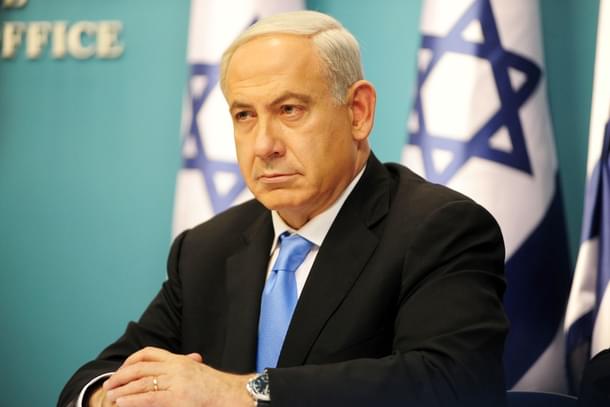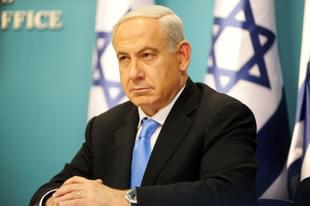World
High Stakes: Netanyahu Hospitalised For Emergency Heart Procedure While Israel Braces Itself For Crucial Vote On Judicial Overhaul
Bhuvan Krishna
Jul 24, 2023, 12:46 PM | Updated 12:45 PM IST
Save & read from anywhere!
Bookmark stories for easy access on any device or the Swarajya app.


Israeli Prime Minister Benjamin Netanyahu is currently in the hospital, recuperating from an emergency heart procedure.
Prior to a significant vote, there are ongoing separate demonstrations held by both supporters and opponents of his government's proposed judicial overhaul plan.
The parliamentary vote set for Monday (24 July) is expected to pass important legislation in the controversial judicial overhaul plan.
The proposed overhaul includes reducing the Supreme Court's ability to challenge parliamentary decisions and altering the process of selecting judges.
During a demonstration in Jerusalem on 23 July 2023, a woman dressed in a 'Handmaid's Tale' costume brandished a red flag to protest against Israeli Prime Minister Benjamin Netanyahu and his nationalist coalition government's judicial overhaul.
This demonstration took place just before the final vote on a law that aims to limit certain powers of the Supreme Court.
The unexpected hospitalization of Netanyahu for a pacemaker implant has added another surprising twist to the already dramatic events that have divided the nation and will have a significant impact on Israel's future.
Netanyahu's doctors confirmed the success of the procedure on Sunday.
However, as of Sunday evening, the Prime Minister remained at Sheba Hospital near Tel Aviv.
In a video message from the hospital, the 73-year-old Netanyahu reassured the public of his well-being and expressed gratitude to his doctors for the treatment he received, as well as for the warm wishes from the public.
Dressed in a white dress shirt and dark blazer, Netanyahu revealed that he was actively seeking a compromise with his opponents while also preparing for a crucial parliamentary vote scheduled for Monday.
The vote aims to solidify an important aspect of the legislation into law.
He informed, "I want you to be aware that I will be joining my colleagues at the Knesset tomorrow morning".
Netanyahu, along with his far-right allies consisting of ultranationalist and ultra-Orthodox parties, argues that these proposed changes are necessary to restrict the authority of unelected judges.
However, their opponents, primarily from Israel's professional middle class, argue that the plan will dismantle the country's delicate system of checks and balances, potentially leading to an authoritarian form of governance.
This proposed judicial overhaul has sparked a contentious debate between the two factions, each with opposing visions for the future of Israel's legal framework.
The proposal has resulted in seven months of extensive protests and has faced strong disapproval from business and medical leaders.
Additionally, there has been alarm due to a notable increase in the number of military reservists in critical units expressing their intention to boycott reporting for duty if the plan is approved. These developments have raised concerns about the potential impact on Israel's security and stability.
In a letter to soldiers on Sunday, military chief Lt Gen Herzi Halevi acknowledged the tensions and warned that they pose a danger to the military.
He emphasized the importance of a strong and unified military, stating that the country's existence in the region depends on it.
President Joe Biden has called on Netanyahu to halt the implementation of the plan, while Israel's ceremonial president, Isaac Herzog, has worked to mediate a compromise between the Prime Minister and his adversaries.
Upon returning to Israel after his visit to the White House, Herzog promptly visited Netanyahu's hospital room.
Herzog emphasized the situation's urgency, stating, "This is a time of emergency. We need to reach an agreement".
Later on Sunday, Herzog planned to hold meetings with Israel's opposition leader, Yair Lapid, and Benny Gantz, the head of National Unity, another opposition party.
As discussions took place, mass rallies both for and against the plan were taking place, with tens of thousands of people gathering.
Netanyahu's supporters filled the streets of central Tel Aviv, typically a site for anti-government protests, while his opponents marched towards Israel's parliament, the Knesset.
Many protesters in Jerusalem set up camp in a nearby park after completing a four-day march from Tel Aviv on Saturday.
Tensions were high as lawmakers began a marathon debate on the first major piece of the overhaul plan, following seven months of mass protests against it.
The debate took place ahead of Monday's vote.
During the session, Simcha Rothman, a prominent figure behind the overhaul, delivered a passionate speech criticizing the courts for undermining Israel's democratic ideals through their arbitrary rejection of government decisions.
"The purpose of this small clause is to reinstate democracy in Israel," stated Rothman, urging Knesset members to approve the bill.
Despite efforts to maintain normalcy, Netanyahu's schedule was disrupted. His weekly Cabinet meeting, originally planned for Sunday morning, had to be postponed.
Furthermore, his upcoming trips to Cyprus and Turkey were being rescheduled, according to his office.
Israeli media reported ongoing last-minute attempts to find a solution to the deadlock.
However, it remains uncertain whether these efforts will yield any positive results.
During Monday's vote, legislators will decide on a comprehensive measure aimed at preventing judges from invalidating government decisions based on their perceived "unreasonableness."
Proponents argue that the current "reasonability" standard grants judges excessive powers over elected officials' decision-making.
On the other hand, critics contend that removing this standard would enable the government to make arbitrary decisions, engage in improper appointments or firings, and potentially invite corruption.
During a parliamentary session, opposition leader Yair Lapid urged Prime Minister Netanyahu to resume compromise talks and commended the protesters for their courageous stance against the government.
In response to the government's actions, Yair Lapid declared, "The government of Israel has initiated a war of attrition against its own citizens, but they have realized that the people cannot be broken. We will not give up on securing a better future for our children".
According to AP, the protesters represent a diverse range of Israeli society and view the proposed overhaul as a power grab motivated by personal and political grievances of Prime Minister Netanyahu, who is currently facing corruption charges.
They also believe that the government aims to further extend Israel's control over the occupied West Bank and maintain controversial draft exemptions for ultra-Orthodox men.
After being hospitalized for dehydration, Netanyahu was rushed to the hospital again in the middle of the night, where he underwent a pacemaker procedure.
This sudden turn of events suggests that his health issues may be more serious than initially disclosed.
The presence of a pacemaker procedure indicates that Netanyahu's health concerns are more significant than what was previously acknowledged.
According to Professor Roy Beinart, a senior physician and director at the Davidai Arrhythmia Center at Sheba Medical Center's Heart Institute, Netanyahu has been dealing with a conduction disorder, or irregular heartbeat, for many years.
The procedure to implant the pacemaker was successful and without complications, according to Beinart. Netanyahu's condition is not life-threatening, and he is feeling well enough to resume his daily activities.
This development is causing significant concern.
Netanyahu and his far-right allies introduced their overhaul plan soon after taking office in January.
However, due to pressure from protesters and labor strikes in March, Netanyahu temporarily suspended the plan. Despite unsuccessful attempts to find a compromise, he recently declared that his government would persist in implementing the plan.
Bhuvan Krishna is Staff Writer at Swarajya.





